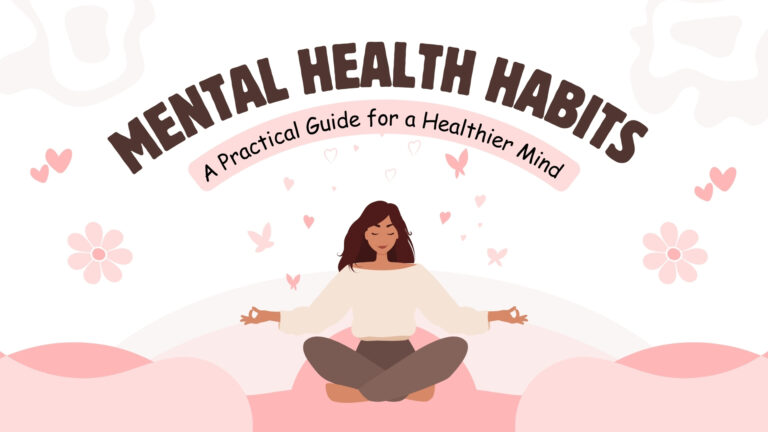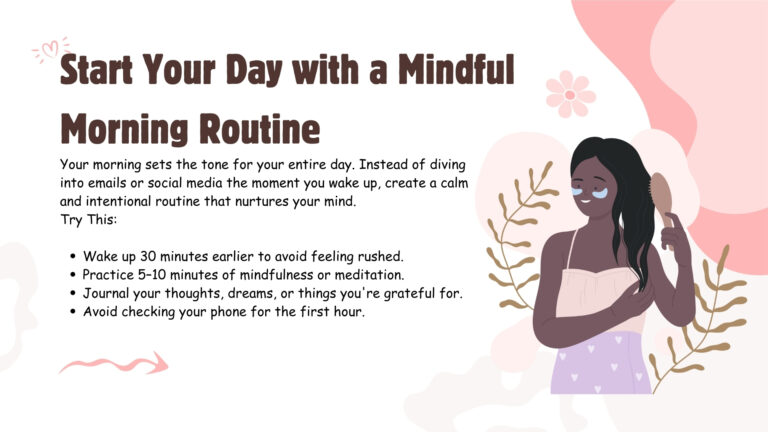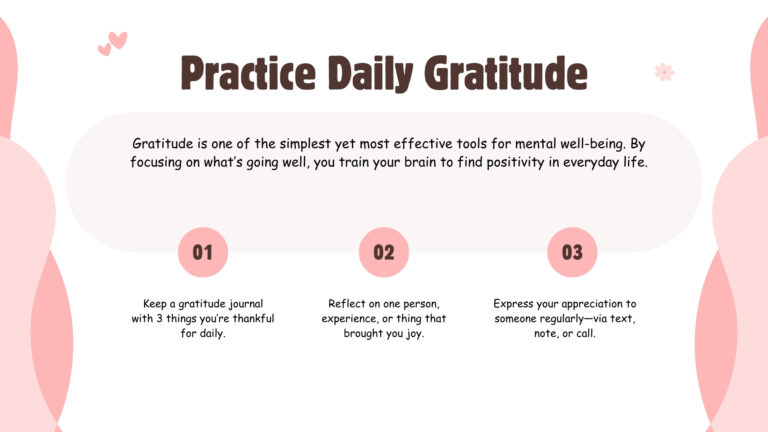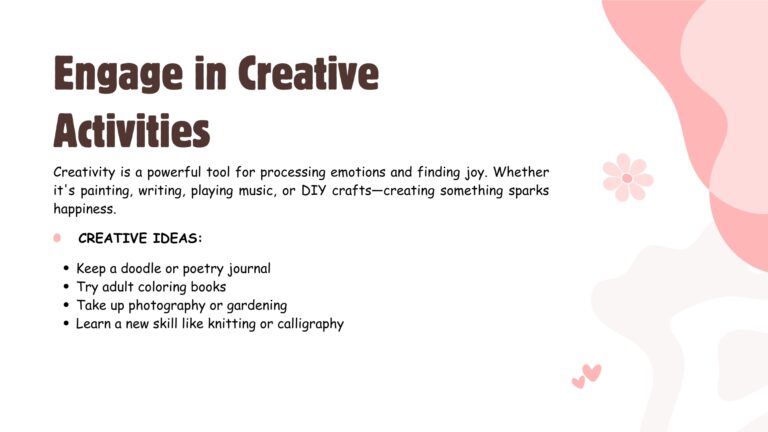Mental Health Habits That Actually Work: A Practical Guide for a Healthier Mind

In a world that constantly demands more—from our time, energy, and attention—taking care of our mental health is not just important; it’s essential. Yet, amidst all the noise about self-care trends, it can be hard to know what truly works. Bubble baths and motivational quotes might give temporary relief, but sustainable mental wellness comes from consistent, practical habits.
So, what are the mental health habits that actually work? This blog dives into research-backed, simple, and effective strategies that you can start using today to improve your emotional well-being.
Start Your Day with a Mindful Morning Routine
Your morning sets the tone for your entire day. Instead of diving into emails or social media the moment you wake up, create a calm and intentional routine that nurtures your mind.

Try This:
- Wake up 30 minutes earlier to avoid feeling rushed.
- Practice 5–10 minutes of mindfulness or meditation.
- Journal your thoughts, dreams, or things you’re grateful for.
- Avoid checking your phone for the first hour.
Why It Works:
Mindful mornings reduce stress hormones, improve focus, and help you feel more in control. A calm start leads to a calmer day.
Move Your Body Regularly
Exercise isn’t just about physical fitness—it’s one of the most powerful mental health boosters available. Regular physical activity releases endorphins, the brain’s feel-good chemicals.
Best Forms of Movement:
- Brisk walking or jogging
- Yoga or Pilates
- Strength training
- Dance or sports
Why It Works:
Even 20–30 minutes of moderate exercise 3–5 times a week can reduce symptoms of anxiety, depression, and ADHD. It also improves sleep and boosts self-esteem.
Practice Daily Gratitude
Gratitude is one of the simplest yet most effective tools for mental well-being. By focusing on what’s going well, you train your brain to find positivity in everyday life.

Try This:
- Keep a gratitude journal with 3 things you’re thankful for daily.
- Reflect on one person, experience, or thing that brought you joy.
- Express your appreciation to someone regularly—via text, note, or call.
Why It Works:
Research shows that gratitude increases happiness, reduces depression, and fosters stronger relationships. It’s a perspective shift that builds emotional resilience.
Set Healthy Boundaries
Learning to say “no” and protecting your energy is a crucial part of maintaining mental health. Whether it’s in relationships, work, or social obligations, boundaries preserve your well-being.
How to Start:
- Identify situations that consistently drain or stress you.
- Communicate your limits clearly and respectfully.
- Practice guilt-free rest and personal time.
Why It Works:
Boundaries prevent burnout and build self-respect. They create space for your priorities and reduce feelings of resentment or overwhelm.
Stay Connected with Supportive People
Humans are wired for connection. In times of stress, anxiety, or depression, the presence of a friend or loved one can be incredibly healing.
Simple Ways to Stay Connected:
- Schedule regular check-ins with friends or family.
- Join a hobby group or community online or in person.
- Seek support from a therapist or counselor if needed.
Why It Works:
Social support reduces feelings of isolation, increases feelings of belonging, and gives you a safe space to share your emotions.
Limit Social Media and Digital Overload
While technology connects us, overuse—especially of social media—can harm our mental health. It often leads to comparison, anxiety, and decreased attention spans.
Practical Tips:
- Set screen time limits or use focus apps like Forest or Freedom.
- Take weekly “digital detox” hours or days.
- Follow accounts that uplift, not drain you.
Why It Works:
Reducing digital noise gives your brain a break, improves sleep, and helps you stay present. Mindful usage can turn tech into a tool instead of a trap.
Fuel Your Brain with Nutritious Food
What you eat has a direct impact on how you feel. Your brain needs the right nutrients to function properly and regulate mood.
Foods that Help:
- Omega-3 rich foods (salmon, walnuts, chia seeds)
- Whole grains and leafy greens
- Fermented foods (yogurt, kimchi, kefir)
- Plenty of water
Why It Works:
Nutritional psychiatry is a growing field showing the gut-brain connection. A healthy gut microbiome supports better mental health and emotional balance.
Get Quality Sleep
Sleep is your brain’s natural reset button. Lack of sleep can increase irritability, anxiety, and even symptoms of depression.
Improve Your Sleep Hygiene:
- Stick to a consistent sleep schedule—even on weekends.
- Limit caffeine and screen use before bed.
- Create a calming pre-sleep routine (reading, stretching, breathing exercises).
Why It Works:
Good sleep helps regulate mood, enhances memory, and gives you the energy to cope with stress. Aim for 7–9 hours each night.
Engage in Creative Activities
Creativity is a powerful tool for processing emotions and finding joy. Whether it’s painting, writing, playing music, or DIY crafts—creating something sparks happiness.

Creative Ideas:
- Keep a doodle or poetry journal
- Try adult coloring books
- Take up photography or gardening
- Learn a new skill like knitting or calligraphy
Why It Works:
Creative expression reduces cortisol (the stress hormone), increases dopamine (the reward chemical), and allows for healthy emotional release.
Seek Professional Help When Needed
One of the strongest habits for mental health is knowing when to ask for help. Therapy or counseling isn’t just for crises—it’s a form of maintenance for your mind.
Signs You Might Benefit:
- Persistent sadness or anxiety
- Trouble sleeping or concentrating
- Feeling overwhelmed or hopeless
- Difficulty in relationships
Why It Works:
Professional help provides clarity, tools, and coping mechanisms. Therapists are trained to guide you through emotional challenges in a safe and structured way.
Practice Self-Compassion
We’re often our own harshest critics. Practicing self-compassion means treating yourself with the same kindness and patience you’d offer to a friend.
Self-Compassion Habits:
- Replace negative self-talk with gentle, affirming words.
- Allow yourself to make mistakes and learn from them.
- Celebrate small wins without judgment.
Why It Works:
Studies show self-compassion reduces stress, builds emotional strength, and fosters motivation—not laziness, as some might believe.
Declutter Your Space
Your environment affects your mind. A messy, chaotic space can contribute to anxiety, while a clean and organized one can feel calming and inspiring.
Easy Decluttering Tips:
- Tidy up one area daily (desk, wardrobe, kitchen).
- Use the “one in, one out” rule for belongings.
- Create a dedicated relaxing space in your home.
Why It Works:
Decluttering reduces mental overload and creates a sense of accomplishment. It also gives your brain fewer distractions and more peace.
Final Thoughts
Mental health isn’t a destination—it’s a lifelong journey. It doesn’t require huge, overnight changes. In fact, small, consistent habits are what lead to the biggest transformations.
If you’re feeling overwhelmed, start with just one habit from this list and build from there. Whether it’s a five-minute morning meditation, a walk in nature, or turning off your phone an hour before bed, every step you take matters.
Remember, prioritizing your mental health is not a luxury—it’s a necessity. And you deserve to feel well, every single day.
Frequently Asked Questions
Simple habits like maintaining a consistent sleep schedule, practicing gratitude, staying physically active, limiting screen time, and making time for relaxation can significantly improve mental well-being.
Exercise releases endorphins—natural mood boosters—and reduces stress hormones. Even a 20-minute walk daily can improve mood, reduce anxiety, and enhance self-esteem.
Yes! Journaling helps you process emotions, track patterns, and release stress. Writing down thoughts, goals, or what you’re grateful for can bring mental clarity and emotional relief.